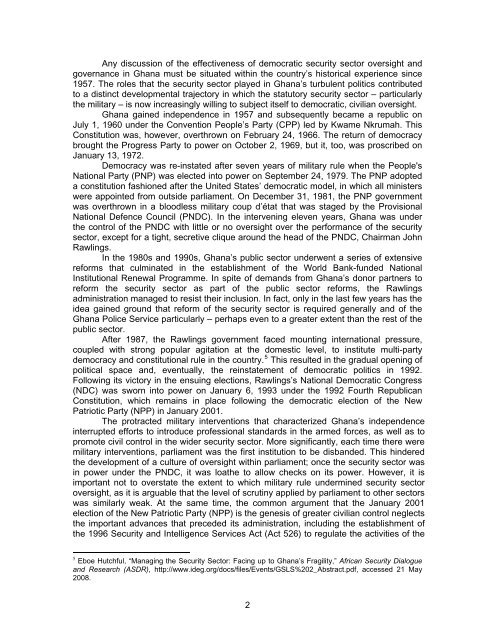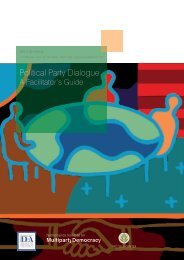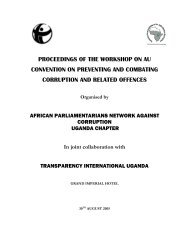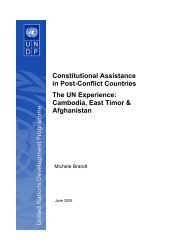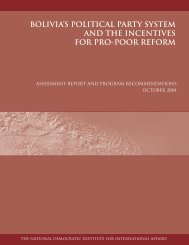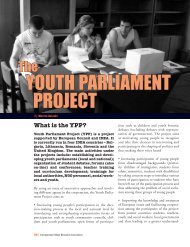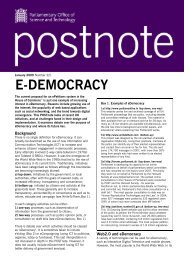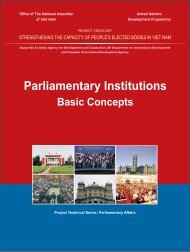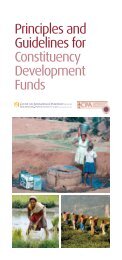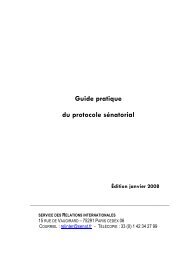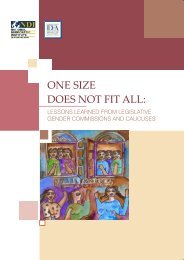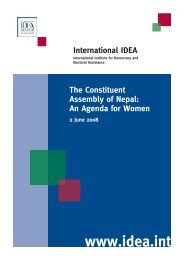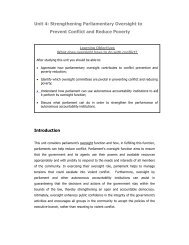Parliamentary Oversight of the Security Sector: Lessons from Ghana
Parliamentary Oversight of the Security Sector: Lessons from Ghana
Parliamentary Oversight of the Security Sector: Lessons from Ghana
You also want an ePaper? Increase the reach of your titles
YUMPU automatically turns print PDFs into web optimized ePapers that Google loves.
Any discussion <strong>of</strong> <strong>the</strong> effectiveness <strong>of</strong> democratic security sector oversight andgovernance in <strong>Ghana</strong> must be situated within <strong>the</strong> country’s historical experience since1957. The roles that <strong>the</strong> security sector played in <strong>Ghana</strong>’s turbulent politics contributedto a distinct developmental trajectory in which <strong>the</strong> statutory security sector – particularly<strong>the</strong> military – is now increasingly willing to subject itself to democratic, civilian oversight.<strong>Ghana</strong> gained independence in 1957 and subsequently became a republic onJuly 1, 1960 under <strong>the</strong> Convention People’s Party (CPP) led by Kwame Nkrumah. ThisConstitution was, however, overthrown on February 24, 1966. The return <strong>of</strong> democracybrought <strong>the</strong> Progress Party to power on October 2, 1969, but it, too, was proscribed onJanuary 13, 1972.Democracy was re-instated after seven years <strong>of</strong> military rule when <strong>the</strong> People'sNational Party (PNP) was elected into power on September 24, 1979. The PNP adopteda constitution fashioned after <strong>the</strong> United States’ democratic model, in which all ministerswere appointed <strong>from</strong> outside parliament. On December 31, 1981, <strong>the</strong> PNP governmentwas overthrown in a bloodless military coup d’état that was staged by <strong>the</strong> ProvisionalNational Defence Council (PNDC). In <strong>the</strong> intervening eleven years, <strong>Ghana</strong> was under<strong>the</strong> control <strong>of</strong> <strong>the</strong> PNDC with little or no oversight over <strong>the</strong> performance <strong>of</strong> <strong>the</strong> securitysector, except for a tight, secretive clique around <strong>the</strong> head <strong>of</strong> <strong>the</strong> PNDC, Chairman JohnRawlings.In <strong>the</strong> 1980s and 1990s, <strong>Ghana</strong>’s public sector underwent a series <strong>of</strong> extensivereforms that culminated in <strong>the</strong> establishment <strong>of</strong> <strong>the</strong> World Bank-funded NationalInstitutional Renewal Programme. In spite <strong>of</strong> demands <strong>from</strong> <strong>Ghana</strong>’s donor partners toreform <strong>the</strong> security sector as part <strong>of</strong> <strong>the</strong> public sector reforms, <strong>the</strong> Rawlingsadministration managed to resist <strong>the</strong>ir inclusion. In fact, only in <strong>the</strong> last few years has <strong>the</strong>idea gained ground that reform <strong>of</strong> <strong>the</strong> security sector is required generally and <strong>of</strong> <strong>the</strong><strong>Ghana</strong> Police Service particularly – perhaps even to a greater extent than <strong>the</strong> rest <strong>of</strong> <strong>the</strong>public sector.After 1987, <strong>the</strong> Rawlings government faced mounting international pressure,coupled with strong popular agitation at <strong>the</strong> domestic level, to institute multi-partydemocracy and constitutional rule in <strong>the</strong> country. 5 This resulted in <strong>the</strong> gradual opening <strong>of</strong>political space and, eventually, <strong>the</strong> reinstatement <strong>of</strong> democratic politics in 1992.Following its victory in <strong>the</strong> ensuing elections, Rawlings’s National Democratic Congress(NDC) was sworn into power on January 6, 1993 under <strong>the</strong> 1992 Fourth RepublicanConstitution, which remains in place following <strong>the</strong> democratic election <strong>of</strong> <strong>the</strong> NewPatriotic Party (NPP) in January 2001.The protracted military interventions that characterized <strong>Ghana</strong>’s independenceinterrupted efforts to introduce pr<strong>of</strong>essional standards in <strong>the</strong> armed forces, as well as topromote civil control in <strong>the</strong> wider security sector. More significantly, each time <strong>the</strong>re weremilitary interventions, parliament was <strong>the</strong> first institution to be disbanded. This hindered<strong>the</strong> development <strong>of</strong> a culture <strong>of</strong> oversight within parliament; once <strong>the</strong> security sector wasin power under <strong>the</strong> PNDC, it was loa<strong>the</strong> to allow checks on its power. However, it isimportant not to overstate <strong>the</strong> extent to which military rule undermined security sectoroversight, as it is arguable that <strong>the</strong> level <strong>of</strong> scrutiny applied by parliament to o<strong>the</strong>r sectorswas similarly weak. At <strong>the</strong> same time, <strong>the</strong> common argument that <strong>the</strong> January 2001election <strong>of</strong> <strong>the</strong> New Patriotic Party (NPP) is <strong>the</strong> genesis <strong>of</strong> greater civilian control neglects<strong>the</strong> important advances that preceded its administration, including <strong>the</strong> establishment <strong>of</strong><strong>the</strong> 1996 <strong>Security</strong> and Intelligence Services Act (Act 526) to regulate <strong>the</strong> activities <strong>of</strong> <strong>the</strong>5 Eboe Hutchful, “Managing <strong>the</strong> <strong>Security</strong> <strong>Sector</strong>: Facing up to <strong>Ghana</strong>’s Fragility,” African <strong>Security</strong> Dialogueand Research (ASDR), http://www.ideg.org/docs/files/Events/GSLS%202_Abstract.pdf, accessed 21 May2008.2


